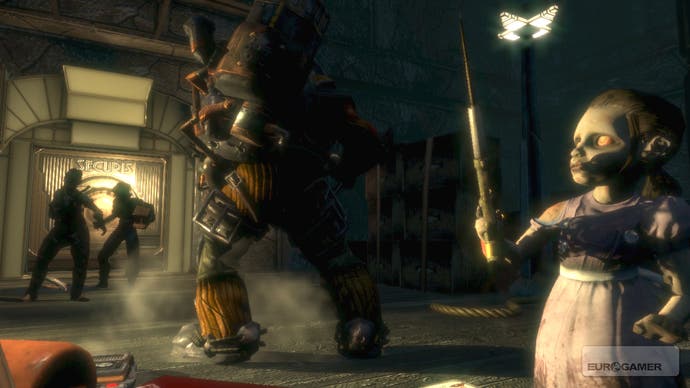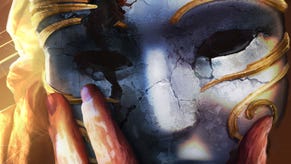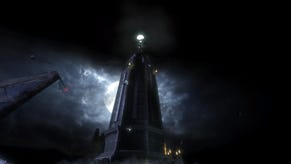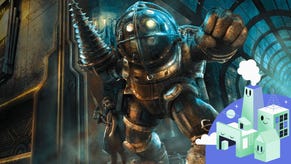BioShock
Cue rapturous applause.
There are so many deft touches at every turn within Bioshock that's it's almost as fun to watch as it is to play. You'll probably spend the first few hours inside Rapture just playing tourist to your own amazement. Nothing's overcooked, and there's this constant feeling that you're wandering through the work of true visionaries. At times it's like walking through a living painting, where every creation makes you want to stop in your tracks and just breathe it all in. Walk up to some of the character models (take the Dolls, for example), and you'll swear they couldn't be infused with any more life than if they were sat there in the room with you staring you out over a Mocha. It might well be created with a modified version of the Unreal 3 engine, but it's got to the stage where you don't even care about the tech so much as the creativity eked out of it all. You almost don't want to know about what's behind the illusion. You're too wrapped up in it.
Simple things take on a new significance. Engage in something as basic as a firefight with a Splicer and the smoke of their gun can often leave you bathed and confused in the most convincing haze imaginable in your hapless attempts to give chase. Wade into a pool and the whole thing ripples; water dribbling down your face, as it splashes and refracts light in a manner that seems almost too natural. Not now. Not yet, surely? But here's BioShock in August 2007, looking for all the world like a game that's landed fully formed from a couple of years in the future. It's a game that's going to make a lot of rival developers either very excited or very depressed indeed over the coming months as they come to terms with how far ahead this game is - not just in technical terms, but in practically every other angle as well. Admittedly, the very nature of the tight, enclosed environments help give Irrational the extra headroom it needed to really pile on the detail levels, but that's not the only reason. There's genuine talent and vision at work here.
So, yes, the atmosphere and artwork is undeniably the thing that effortlessly grabs hold of the player, but BioShock is so much than an immersive tech demo poster child thanks to the amount of credibility that's been infused into every part of the game world: be it the combat, the exploration, the narrative, or the puzzling. It's a game that breaks down so well however you want to deconstruct it. And unlike so many shooters, this isn't a game that wilfully funnels you through narrow environments. The overarching nature of the game is still admittedly linear, but it's the kind of linearity that allows the player to poke around to your heart's content, and flit back and forth as and when you fancy sniffing out a few more secrets from a previously neglected area (and believe me, there'll be plenty). It's a game that will entice you to look at its map to explore, scavenge and go off the beaten track. And it's not just about the treasure hunt, either. With its subtle audio narrative forming as you go along, there's an even greater incentive to take you time - not only to discover yet more hidden audio diaries from the lost inhabitants, but because you're almost always rewarded for your explorational persistence.
As beautiful as Rapture looks from a furtive glance around its ornate marble-lined halls, whoever is left wanted to make damn sure that anyone attempting to unravel its secrets would meet swift retribution. Behind all the gloss and glorious attention to detail lies a game that, at its core, is just a shooter that wants to make things as fun and diverse for the player as possible. Security camera systems trigger flying sentry cannons. Tripod-mounted turrets spit hot lead the split second you poke your head around a corner you're not supposed to. Strange, mutated 'Splicers' hunt in packs at every turn. It might look like a quaint, crumbling underwater museum that's full of intrigue, but it hides secrets that only the extremely determined will get to find out.

Bypass all these extreme security measures and you might have the pleasurable company of those legendary 'Big Daddy' creatures that you might have seen hanging out in your local game emporium (or is that just a commentary on the West's obesity epidemic?). These lumbering galoots, jealously stomp through the puddles on an inexplicable mission to guard syringe-wielding pre-pubescent girls known as 'Little Sisters'. Decked out in a rusting diving suit and uttering low scowls of discontent, they're not the kind of opponents that offer a fair fight. They're unexpectedly nimble, and armed with uncompromisingly brutal attacks - they're not the kind of foe that you're going to be able to take down without an almighty battle of wills. BioShock isn't a game that ever wants to make things easy for you. It tests you almost to force you to experiment - and that brings its own rewards.
That said, one of the most appreciated design decisions is how BioShock handles death. If you lose your health, there's never any need to restart from a checkpoint - essentially what happens is you get regenerated in a nearby pod, and carry on the fight from where you left off. Not only does this reduce frustration immensely, it means there's a kind of meaningful continuity about proceedings - the kind that has never existed in any shooter. Although this might sound like an awful cop-out in theory, in practice, it's a master-stroke, and one that'll help people carry on when otherwise they might well have given up.







